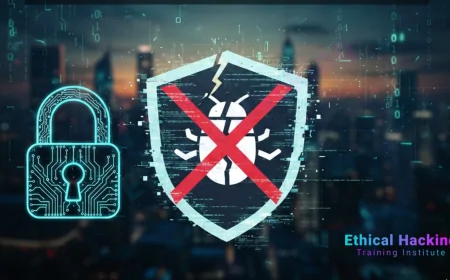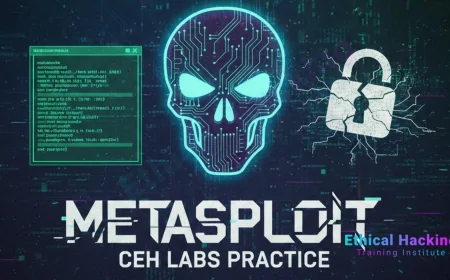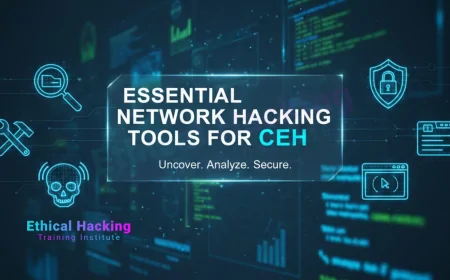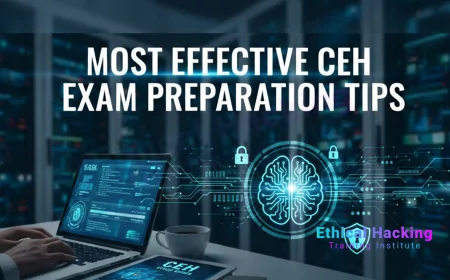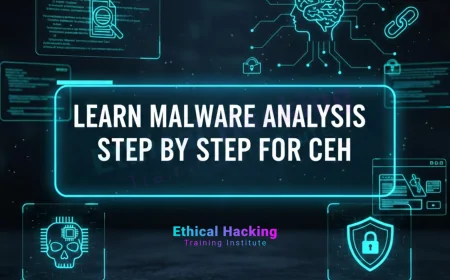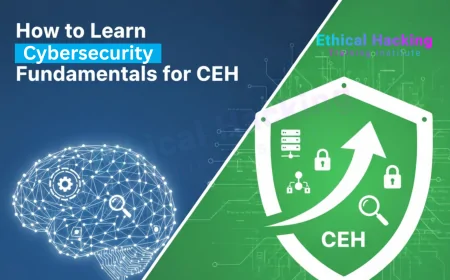Certificate Ethical Hacking Courses: A Complete Guide to Getting Certified | A Beginner’s Roadmap to Ethical Hacking Certifications and Courses
Explore top ethical hacking certification courses, training paths, and expert guidance to become a certified ethical hacker and advance your cybersecurity career.
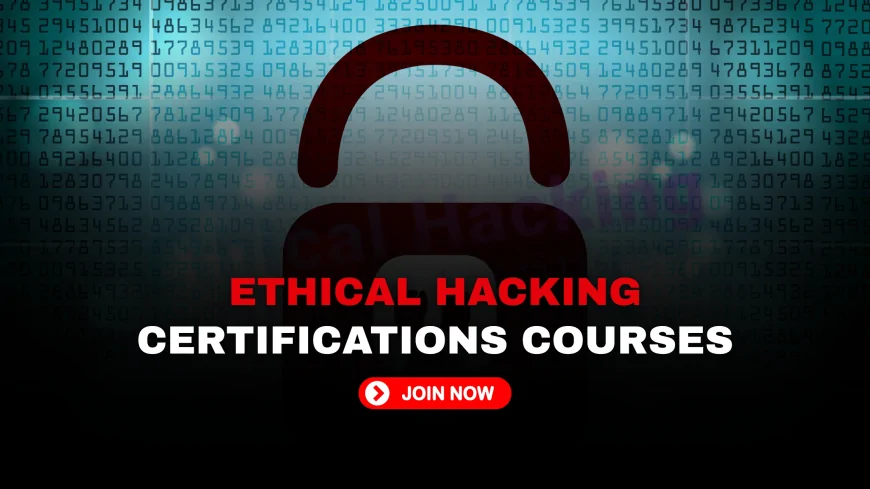
Table of Contents
- Introduction
- Why Get an Ethical Hacking Certificate?
- Popular Ethical Hacking Certifications
- How to Choose the Right Certification
- Training Pathways & Formats
- Curriculum & Exam Overview
- Hands-On Labs & Practical Training
- Study Strategies & Resources
- Exam Preparation Tips
- Career Outlook & Salary Benefits
- Cost vs ROI Analysis
- What to Do After Certification
- FAQs
- Conclusion
Introduction
In 2025, cybersecurity professionals with ethical hacking credentials are in high demand. Whether you're targeting Certified Ethical Hacker (CEH), OSCP, CompTIA PenTest+, or others, certifications validate your skills and open doors to high-paying roles. This guide covers everything from choosing the right certification to preparing, passing, and leveraging your credential.
Why Get an Ethical Hacking Certificate?
In today’s cyber-threat landscape, the demand for certified cybersecurity professionals is higher than ever. Whether you're a beginner or a mid-career IT professional, earning an ethical hacking certification can significantly boost your credibility, skills, and job prospects.
1. Global Industry Recognition
Certifications such as CEH (Certified Ethical Hacker), OSCP, and CompTIA PenTest+ are globally respected and recognized by organizations like IBM, Microsoft, the U.S. Department of Defense, and more. They serve as trusted benchmarks of your technical expertise in ethical hacking.
2. Validates Practical Cybersecurity Skills
Ethical hacking certificates verify your ability to use tools like Nmap, Metasploit, Wireshark, Burp Suite, and others. They prove that you can think like a hacker—and defend against one.
3. Enhances Job Opportunities
Employers actively seek certified candidates for roles such as:
- Penetration Tester
- Cybersecurity Analyst
- SOC Analyst
- Security Consultant
- Red Team Specialist
4. Increases Salary Potential
Achieving CEH certification may lead to a substantial salary increase, typically between 15% and 30%. According to recent surveys, CEH-certified professionals often make over $100,000 annually in developed markets.
5. Builds a Strong Foundation for Career Growth
These certifications are stepping stones to advanced credentials like OSCE, GPEN, CISSP, and more. They lay the groundwork for specialized domains such as cloud security, IoT security, and malware analysis.
6. Keeps You Up-to-Date with Cybersecurity Trends
Certifications often require continued learning and renewal, ensuring you stay current with the latest attack vectors, vulnerabilities, and defense mechanisms.
7. Increases Credibility and Trust
Whether you're applying for a job, freelance gig, or consultancy project, a certification adds professionalism and trust—especially when you're dealing with sensitive systems and client data.
8. Supports Compliance with Industry Standards
Certified professionals help organizations meet standards such as ISO 27001, GDPR, HIPAA, and PCI-DSS, where strong cybersecurity controls are mandatory.
Popular Ethical Hacking Certifications
CEH (Certified Ethical Hacker v13)
Offered by EC-Council. Includes 125 MCQs + optional practical exam (CEH Master). Covers methodology from reconnaissance to reporting.
OSCP (Offensive Security Certified Professional)
A fully hands-on, 24-hour penetration test exam with report-writing. Highly respected in the pentesting community.
CompTIA PenTest+
Blends MCQs and performance-based tasks. Good for entry-to-mid level pentesters.
GIAC GPEN
Focusing on practical skills, this SANS credential teaches penetration testing through real-world scenarios and methodologies.ues.
eCPPT (eLearnSecurity Certified Professional Pentester)
Offers a lab-based exam and unlimited retakes—convenient for those with limited testing time.
How to Choose the Right Certification
- Match your expertise: CEH is beginner-friendly, whereas OSCP and GPEN cater to advanced ethical hackers.
- Consider learning format: MCQ-based vs purely hands-on.
- Check industry recognition in your region: OSCP in pentesting firms; CEH widely across industries.
- Evaluate cost and time: Some certs take weeks, others months.
Training Pathways & Formats
- Instructor-led: Participate in real-time classes with industry leaders like EC-Council iClass, SANS, and Offensive Security.
- Self-paced: Online video courses (Udemy, Pluralsight) with optional labs.
- Hybrid/Bootcamp: Weekend intensives combining live lectures and labs.
- Self-study: Books, VMs, YouTube tutorials, community labs.
Curriculum & Exam Overview
Generally includes:
- Reconnaissance, scanning & enumeration
- System & network exploitation
- Web, wireless, mobile, IoT hacking
- Post-exploitation & pivoting
- Cryptography and report writing
Certification exams vary from 125 MCQs (CEH) to fully practical (OSCP).
Hands-On Labs & Practical Training
- Official platforms: CEH iLabs, OSCP PWK labs, SANS NETG labs.
- Community labs: TryHackMe, Hack The Box, OverTheWire.
- Self-built labs: VirtualBox with vulnerable VMs like DVWA and Metasploitable.
- CTFs: Practice real security challenges and timed hacking exercises.
Study Strategies & Resources
- Follow exam blueprints and align study weeks.
- Mix theory with lab practice daily.
- Use flashcards for tools, commands, CVEs.
- Join communities: Discord, Reddit, LinkedIn.
- Take practice exams and review errors thoroughly.
Exam Preparation Tips
- Simulate timed tests under exam conditions.
- Review labs and tool outputs before exam day.
- Create cheat sheets for command syntax.
- Rest well—mental clarity is key.
Career Outlook & Salary Benefits
Ethical hacking roles include:
- Penetration Tester: $80k–150k+
- SOC Analyst: $60k–110k
- Red Team Specialist: $90k–160k
- Security Consultant: $100k–170k
Certifications frequently lead to promotions, pay raises, and consulting opportunities.
Cost vs ROI Analysis
| Certification | Cost | ROI Timeline |
|---|---|---|
| CEH | $900–1,500 | 6–12 months |
| OSCP | $1,500–3,000 | 12–18 months |
| PenTest+ | $350–500 | 6–9 months |
| GPEN | $5,000–6,500 | 12–24 months |
What to Do After Certification
- Pursue advanced certs like OSCP, GPEN, CISSP.
- Join bug bounty programs and CTFs to build a portfolio.
- Networking: join cybersecurity meetups and professional forums.
- Document and share your work via GitHub, blogs, or LinkedIn.
FAQs -
1. What is the difference between CEH and OSCP?
CEH includes theory and labs, while OSCP is fully hands-on with an intensive 24-hour exam.
2. Can I self-study for these certifications?
Yes—many succeed through disciplined self-study, labs, and community support.
3. How long does each certification take?
CEH/Pentest+: ~3–6 months; OSCP: 6–12 months; GPEN: 6–18 months depending on experience.
4. Do certifications guarantee a job?
No—but they greatly improve your chances by demonstrating competence and commitment.
5. Are practical labs essential?
Yes, hands-on practice is critical for deep understanding and real-world readiness.
6. How much do certified ethical hackers earn?
Across the US, salaries typically range from $80k to $160k, depending on experience and role.
7. What’s the passing score for CEH?
Usually between 60–85%, depending on exam difficulty.
8. Can I take exams online?
Yes—most certs now offer online proctored exam options.
9. How often do certifications need renewal?
CEH: every 3 years with 120 credits; OSCP & GPEN: vary—check provider’s renewal policy.
10. Which certification is best for entry-level?
CompTIA PenTest+ and CEH are recommended for beginners.
11. Is networking knowledge required?
Yes—understanding TCP/IP, routing, and subnetting is essential for ethical hacking.
12. What tools do I need to learn?
Nmap, Metasploit, Burp Suite, Wireshark, SQLmap, Hydra, Aircrack-ng, etc.
13. Are bug bounties a good follow-up?
Yes—bug bounty programs help you apply skills, earn income, and build reputation.
14. How do I study for practical exams?
Practice with vulnerable VMs, replicate lab scenarios, document each step, write reports.
15. Does CEH include cloud hacking?
Yes—CEH v13 adds modules on AWS, Azure, and cloud penetration testing.
16. What certifications come after these?
Advanced paths: ePHX, CRTP, OSCE, CISSP, CISM, specialized cloud/hybrid security certs.
17. How do I track my progress?
Use study logs, lab journals, mock test scores, and certification attempt records.
18. Should I join study groups?
Yes—peer discussion deepens understanding and keeps motivation high.
19. Can I do multiple certifications in parallel?
Possible—but it’s often better to focus on one until you pass before starting the next.
20. How important is report writing?
Very—penetration testing reports are crucial deliverables; clarity and professionalism matter.
Conclusion
Choosing and completing an ethical hacking certification is a transformative step in your cybersecurity career. By aligning your skills, interests, and career goals, engaging in structured training, and applying knowledge through labs and real-world scenarios, you can boldly advance into ethical hacking roles. Certifications validate your expertise, expand opportunities, and elevate your professional standing.
What's Your Reaction?
 Like
0
Like
0
 Dislike
0
Dislike
0
 Love
0
Love
0
 Funny
0
Funny
0
 Angry
0
Angry
0
 Sad
0
Sad
0
 Wow
0
Wow
0
